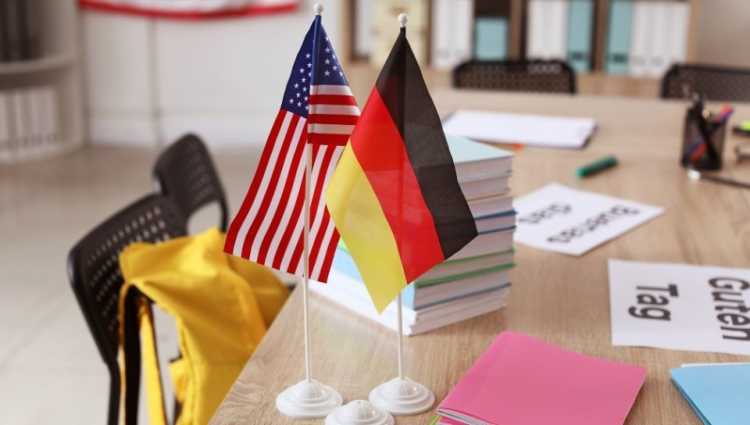Germany school choices for military kids
by Becca Stewart - December 7th, 2021

Schooling is one of the most important factors in any move. When moving stateside, military families have multiple options, in various locations near base or post. But an overseas move drastically reduces those options, leaving many military families feeling anxious.
School options for military kids in Germany
The Department of Defense recognizes the importance military families place on education. The quality of our children's education directly impacts military readiness and satisfaction. Therefore, all service branches acknowledge the need to provide high-quality education to military kids living abroad.
While most American military children attend schools operated by the U.S. Government, other options are available.
DoDEA Schools
In Germany, most children of service members attend the Department of Defense Education Activity (DoDEA) schools. DoDEA operates schools throughout the U.S. and in both the Pacific and European Regions. Most of these schools are on military installations.
DoDEA Europe operates 64 schools, prekindergarten through 12th grade, in eight countries. These schools are free and open to U.S. service members and contractors. DoDEA schools are accredited and offer many of the same programs found in U.S. schools. Children have access to gifted learning programs, competitive sports, AP courses, and accommodations for students with disabilities.
In case you're wondering about the quality of a DoDEA education, DoDEA schools regularly lead the nation in standardized testing results.
If you want your child to attend the DoDEA school on your installation, contact that school as soon as you have orders to Germany.
German Schools
Most American families will put their kids in DoDEA schools. However, students can attend the local German school as well. The German education system is similar to the American system for younger children. However, German schools differ significantly in the middle and high school ages.
For families with younger children, German schools are an incredible cultural immersion experience. Each German village has a Kinderkrippen (nursery school for children under three) and Kindergarten (for children ages three to six). Just as in the U.S., there are public and private school options. Public school is mainly free, while private schools charge tuition.
Most public schools teach exclusively in German. Some private schools will be bilingual, but it's safe to assume your child's classroom will be German taught. Young children tend to soak up new languages quickly, so don't shy away from public preschool or primary schools for this reason.
Contact your duty station's education office or the village's education authority if you're interested in putting your child in your local German school.
International Schools
International schools are a great option for children who want to interact with German and other international students while continuing to learn English.
Some military installations do not have DoDEA schools. At these locations, an international school can be an excellent alternative. Most international schools offer pre-K through 12th grade education, smaller class sizes, and high-quality teaching. Many are private, so expect to pay a fee for your child to attend.
For middle and high school children, international schools will closely resemble the American education system. Many offer Advanced Placement (AP) or International Baccalaureate (IB) courses, allowing students to receive college credits that will transfer to American schools.
If you want to know more about international schools near your new duty station, contact your installation's School Liaison Officer or check out this helpful guide.
Homeschool or online school
Homeschool and online schools are increasingly popular options, especially in light of the pandemic. While homeschooling is illegal in Germany, American service members and their families are not bound by this law. You can also request evaluation and services for your child through the DoDEA schools, even if you are homeschooling your child.
Online options are more abundant than ever. As an American citizen, your child can attend any accredited online school. DoDEA also runs DoDEA Virtual High School, though it is primarily a supplemental program as of this writing.
For more information about homeschooling in Germany, including online programs and support groups for homeschooling families at your duty station, check out the DoDEA homeschooling page. You may also contact your installation's School Liaison Officer.
Children with learning disabilities
Special Education programs are common in most DoDEA schools in Germany. However, not all bases offer the same level of services. If your child has a disability, the gaining installation's EFMP coordinator will reach out to determine whether or not that base can meet your child's needs.
If your child is on an IEP or 504, contact the school you want your child to attend and tell them what services your child needs. Many larger military installations in Germany have the services required to support your child, but a school administrator or the School Liaison Officer will know for sure.
Resources for parents
Want to know more about school options for military kids in Germany? Here's where to go for more information:
Contact the base education office or the School Liaison Officer
Ask your sponsor about local school options
Find online homeschooling support groups for your new duty station or region
Learn more about PCSing and new schools in this blog post.







